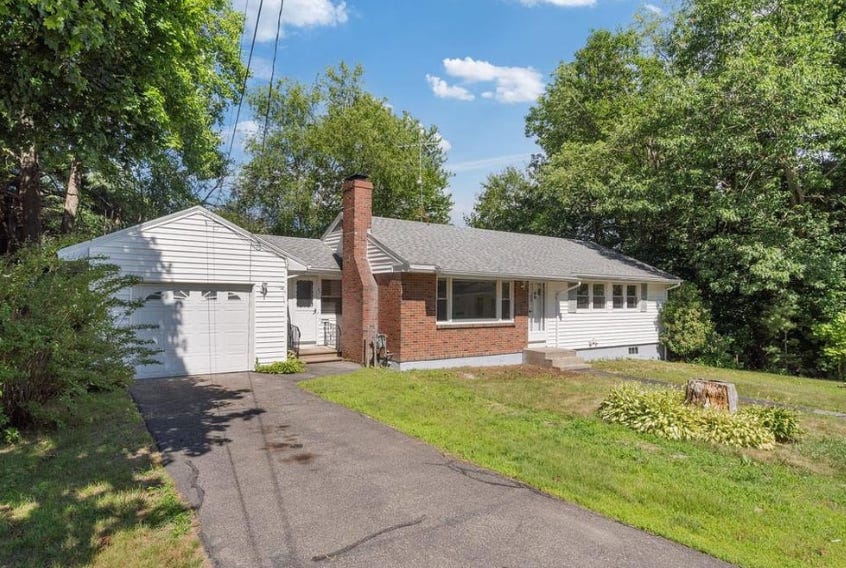Batman's Still Gotta Know
Price drops, whisper listings, and the bat signal you weren’t supposed to see.
I went to an open house last week, and standing in a fairly empty kitchen, I asked the listing agent how the open house had gone. Did she have a lot of people come through?
“We’ve had a lot of people,” she said.
“Really? How many?” I was one of three people who had put their names on the sign-in sheet.
“Oh, a lot,” she said.
“Any offers in hand yet?” I asked.
“Oh, no not yet but a couple people said they might.”
“Well, that’s good,” I said.
“Do you have a buyer?” she asked.
“Yeah, I do and this would be a perfect fit for her, but she’s not ready to start looking for homes until next month because of extenuating circumstances.”
“Oh, gosh well we can’t wait that long at all because the sellers are under contract and need to sell so they can close on their new house.”
A week later I got an email that announced
Thank you for taking the time to visit _______during our recent open house. I wanted to keep you informed of an exciting update: the property has now been price reduced to $______. This adjustment aims to make this beautiful home even more accessible to interested buyers like yourself.
The reduction was a full $100,000 less than at the open house.
One month ago, I published a piece about a listing in Dover that appeared, disappeared, and reappeared on the MLS like a ghost. It sold for $15K over asking in six days. But the oddity wasn’t the speed—it was that no one could find the listing unless you were part of Compass's internal ecosystem.
That essay argued what the data couldn’t quite yet say aloud: this market isn’t irrational; it’s gamed by the sellers, by the buyers, and by the systems themselves—via shadow inventory, delayed marketing, and engineered scarcity.
And in the last week, I’ve seen in my newsfeeds crazy lawsuit fights between Zillow and Compass. Compass wants to keep their listings in-house, and yet continue to utilize Zillow’s public fronting listing service to advertise their pocket listings.
Uhm, I don’t get this at all. By advertising a pocket or private listing anywhere online, you are automatically making the listing public—just not available on the MLS.
Zillow, which is a brokerage, that must follow NAR guidelines and rules, has stated that if a listing is advertised anywhere else before the listing shows up on the MLS, Zillow won’t allow the property on their platform.
And Compass is crying “Monopoly!”
But what they want is to privately advertise their listings on their own site, to their own agents, for as long as they want—which is fine, and frankly points toward a non-monopoly. But then use Zillow’s massive public reach whenever it becomes convenient.
That’s like saying:
“We want to host an exclusive pre-sale party, invite only our friends, keep it quiet, but not really quiet, and then later—after we've tried to sell it on the down-low but not really on the down-low—we want a front-row spot in the public parade.”
Except Zillow’s parade requires full disclosure. Because, you know, NAR policies.
But also the lawsuit feels a bit like those Facebook posts where you declare that you’re not allowing Facebook to use any of your personal data. You signed up for that; you know that you already said okey-dokey to that, right?
It’s also maybe a bit like Elon Musk having threatened to sue any company that refused to advertise on X.
Mauricio Umansky—yes, the celebrity broker from The Agency—just refiled an antitrust lawsuit against NAR itself, thirty minutes after a litigation freeze lifted. His company, Pocket Listing Service, runs a “whisper” network of luxury off-market listings in LA. And he’s claiming NAR’s Clear Cooperation Policy—the same one at the center of Compass v. Zillow—is an illegal monopoly that’s killing innovation.
In other words:
“You’re forcing us to make things public when our whole value prop is secrecy.”
Which, sure—would I guess make sense if you’re selling $20 million Malibu estates to movie stars who don’t want strangers in their kitchens and controlled if controlled access wasn’t already possible with a public listing. Except, Covid taught Realtors how to do virtual tours pre-qualified showings, agent-to-agent marketing, NDAs, and scheduled walkthroughs all while still honoring MLS rules and public disclosure.
The threat level of a TMZ reporter to show up to an open house is low low.
These lawsuits aren’t about protecting privacy but about creating curated scarcity masquerading as a luxury service.
And Umansky and Compass are on opposite sides of the industry branding spectrum—one sells opulence, the other scale—yet both are fighting the same rule: You can’t call it a private party and then demand access to the public square.
This is about who owns visibility, who owns the bat signal, who defines inventory, and who gets to tell the story of a house before you the consumer even know the house exists.
Story sells.
This is what economist Kayla Scanlon has been preaching for months now. Heck, I have a business book on my desk right now titled Story or Die.
I have a whole dang reading list if you want:
The point is: the narrative always comes first. The market just acts it out.
And so if we go back to that open house I attended last week—what was the story that the agent was telling and what was the story that actually got told? And if you know the price point is nothing more than a narrative, a manufactured number how do you manipulate the plot?
Well, if you’re a seller, if you overprice your house then you’re yesterday’s Zillow saved search. Anything over $750k better bring high-end visuals, a killer narrative, and a list price that leaves room for ego bruises in negotiation. Expect buyers to get pickier and expect agents to start whispering “price drop” like some sacred chant (if they already haven’t been).
If you’re a buyer, focus on homes with 15 days on market or more because statistically 43% of those properties will experience a price drop. Get pre-approval locked and move like a caffeinated Robin.
The Bare Bones Numbers 💀📉
📍 Statewide New Hampshire Housing Market
Active Listings: 2,351
Closed Sales (Last 6 Months): 3,606
Pending Sales: 884
Median Days on Market (DOM): 12
Inventory: 3.91 months
Affordability Index: 82
📍 Seacoast Area
Active Listings: 350
Closed Transactions (Last 6 Months): 722
Pending Transactions: 199
Days on Market (DOM):
Highest: 157
Average: 11
Median: 6
Pricing Trends:
Lowest List Price: $145,000
Lowest Sold Price: $135,000
Average List Price: $751,944
Average Sold Price: $757,212
Median List Price: $625,000
Median Sold Price: $630,000
📍 Tri-City Area (Dover, Somersworth, Rochester)
Active Listings: 63
📍 Durham, Newmarket, Madbury & Lee
Active Listings: 21
📍 Portsmouth & Newington
Active Listings: 35
PROPERTY OF THE WEEK AND OPEN HOUSE
🛏️3 Beds, 🛁2 Baths, 📏1,336 sq ft, $799,900
OPEN HOUSE SATURDAY 7/5 AND SUNDAY 7/6 11:00AM-1:00PM
Estimated payment: $5,704/mo
Estimation provided by Keller Williams Realty Inc.
Contact a mortgage broker today!
Dead-end street. Full-sun backyard. 6 minutes to downtown. Boom.
Tucked at the end of a quiet street in one of Portsmouth’s best-kept pockets, 25 Sims Ave is the kind of place that doesn’t shout—but keeps getting better the longer you stay. Single-level living, natural light for days, real hardwood floors, and a kitchen with stainless steel finishes that spark joy.
The 3BR / 1.5BA layout is easy to live in, and easy to love—and the attached garage and sunny back deck seal the deal.
Walk in this weekend and picture: your first home, your last downsize, your summer dinner parties under a string of lights. This home fits.
Just minutes to downtown, but tucked away from the noise.
Come feel it for yourself.
OUR FEATURED BUSINESS
Too many emails? You can manage your subscription here.









